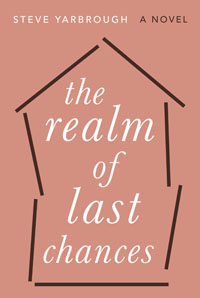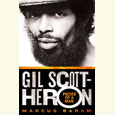Sullen Comfort
Steve Yarbrough masterfully chronicles an unlikely love triangle cast against the bleak landscape of academic politics
Steve Yarbrough concludes the first chapter of his new novel, The Realm of Last Chances, with the image of a woman sitting on the porch of a new home two thousand miles from the one where she’s lived for more than half of her life. The dog has just awoken from a feverish dream; the woman—Kristin, a recently downsized academic-turned-administrator who has taken the only job available to her, at barely half her former salary—tries to console the troubled dog. “‘We’ll get used to it here,’ she whispered, realizing that she really didn’t have much more choice than the dog.” This quiet miracle of a paragraph is classic Yarbrough: delicate and understated; faintly comic; full of haunting, aching pathos and truth.
 Yarbrough has rightly earned a reputation as one of the freshest voices of Mississippi, the South’s richest and most intimidating literary territory. With The Realm of Last Chances, he turns an eye toward his adopted home of Massachusetts (where he is professor of creative writing at Emerson College in Boston), presenting a delicate and deeply affecting story of displacement and emotional ennui set during the darkest time of the Great Recession. Though enriched by Yarbrough’s unmistakably Southern prose style, The Realm of Last Chances owes more to Cheever, Updike, and Richard Yates than to Faulkner and Welty.
Yarbrough has rightly earned a reputation as one of the freshest voices of Mississippi, the South’s richest and most intimidating literary territory. With The Realm of Last Chances, he turns an eye toward his adopted home of Massachusetts (where he is professor of creative writing at Emerson College in Boston), presenting a delicate and deeply affecting story of displacement and emotional ennui set during the darkest time of the Great Recession. Though enriched by Yarbrough’s unmistakably Southern prose style, The Realm of Last Chances owes more to Cheever, Updike, and Richard Yates than to Faulkner and Welty.
As the novel opens, Kristin Stevens, the novel’s central protagonist, has lost her job as a vice-president at a prestigious California university as a result of budget cuts brought on by the recession. Kristin and her second husband, Cal—a self-employed builder and amateur musician whose own prospects have dried up—land in New England as a last resort, when Kristin is hired as a dean at a comparatively mediocre state college.
Both Kristin and Cal fumble desperately for some way to ease the sense that the hopeful phase of their lives has ended. Cal finds private solace, secretly popping antidepressants and working with his hands, either on home-remodeling projects or on his beloved guitars and mandolins. He loathes the pretensions of higher education but is married to an academic; he plays music—brilliantly, we are told—but refuses to allow himself to be referred to as a musician. He isn’t interested in anything his wife has to say, but he listens, “since listening was the best thing you could do for someone you loved.” He keeps secrets—like his self-prescribed stash of sertraline, and his troubling family history—and harbors a potential for explosive violence. For all his contradictions, Cal’s obsessions reflect a soul yearning for permanence. Looking at their dilapidated Victorian home, he experiences “a degree of wonder that he supposed must be akin to what a religious person feels upon visiting a holy site. With his own hands, he’d never made anything that would last as long as these houses. And when he was gone, he’d leave nothing behind.”
 As Cal silently drifts away from her, a random connection—a t-shirt featuring the expatriate Czech novelist Milan Kundera—leads Kristin to befriend their new neighbor, Matt Drinnan, whose cocaine habit has cost him his family and his job as a buyer for a large bookstore in Cambridge. Reduced to living in his mother’s deteriorating house and working at a deli owned by a childhood friend, Matt is a portrait of regret and inertia. “Lately he felt insubstantial, weightless, as if he were merely the idea of a person than the real thing,” Yarbrough writes. “People weren’t just a past or a present or a set of extinguished expectations. They had to have a future too, and for himself he failed to see one.” Though Kristin is ten years Matt’s elder, their shared sense of having ended up in a place of emotional isolation and thwarted prospects makes their affair as understandable as it is inevitable.
As Cal silently drifts away from her, a random connection—a t-shirt featuring the expatriate Czech novelist Milan Kundera—leads Kristin to befriend their new neighbor, Matt Drinnan, whose cocaine habit has cost him his family and his job as a buyer for a large bookstore in Cambridge. Reduced to living in his mother’s deteriorating house and working at a deli owned by a childhood friend, Matt is a portrait of regret and inertia. “Lately he felt insubstantial, weightless, as if he were merely the idea of a person than the real thing,” Yarbrough writes. “People weren’t just a past or a present or a set of extinguished expectations. They had to have a future too, and for himself he failed to see one.” Though Kristin is ten years Matt’s elder, their shared sense of having ended up in a place of emotional isolation and thwarted prospects makes their affair as understandable as it is inevitable.
Kristin’s infidelity is cast against the background of a plagiarism investigation that lays bare the increasingly political and politicized nature of scholars in an age of shrinking higher-education budgets. As dean, Kristin must review and vote on tenure applications. In doing so, she discovers two instances of egregious plagiarism—including one by a popular professor who happens to be a favorite of Kristin’s boss, an ill-tempered provost who resents Kristin’s pedigree. This subplot enables Yarbrough both to skewer the absurdities of university politics—where “everyone is at war with each other because never before was so little at stake”—and to juxtapose Kristin’s role as reluctant inquisitor into the crimes of others with her own ongoing deception.
Perhaps the greatest feat of The Realm of Last Chances is Yarbrough’s ability to convey reckless, self-destructive decisions made by imperfect but otherwise thoughtful and endearing people as natural and understandable, no matter that they are doomed to end in disaster. Just as they both sense the other’s readiness to transition from friendship into illicit romance, Matt grasps Kristin’s hand and says, “I used to be better than this.” “I used to be better than this too,” Kristin replies. It is perhaps natural for Kristin and Matt to reach out to each other in a time of extreme emotional need, but, of course, a toll will be exacted for their carelessness. And both could be forgiven for thinking that Cal wouldn’t care if he knew, but, of course, he does, and he will. No one wants to hurt anyone—does anyone ever want to hurt someone else?
Near the mid-point of the novel, Matt Drinnan recalls a personal anecdote donated from Yarbrough’s own experience: an encounter at the Newbury Steakhouse in Boston with Richard Yates, author of the classic novel Revolutionary Road and legendary “writer’s writer” whose influence Yarbrough gratefully acknowledges in The Realm of Last Chances. Matt gushes to Yates about how much he admires the novelist’s work—especially A Good School. “A Good School’s an etude,” Yates says, correcting the young disciple. “Revolutionary Road’s a symphony. The closest I ever came to writing one, anyway.” Years later, Matt arrives at a melancholy conclusion that adroitly distills the theme of The Realm of Last Chances, a novel that may well endure as a time capsule from the Great Recession, the moment we all began to accept that our best days might be behind us. Gradually, Matt has come to admire Yates for being able to recognize that his first novel was his best, and that what had followed, however worthy, would necessarily pale in comparison. “No one could write a symphony every day,” Matt thinks. “And no one could live one, either.”
Steve Yarbrough will discuss The Realm of Last Chances at Parnassus Books in Nashville at 6:30 p.m. on August 6, 2013.


